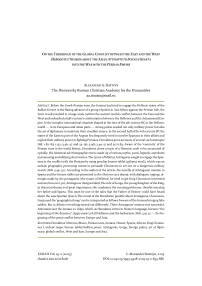On the Threshold of the Global Conflict between the East and the West. Herodotus’ Stories about the Asian Attempts to Involve Sparta into the War with the Persian Empire
Автор: Alexander A. Sinitsyn
Журнал: Schole. Философское антиковедение и классическая традиция @classics-nsu-schole
Рубрика: Статьи
Статья в выпуске: 2 т.19, 2025 года.
Бесплатный доступ
Before the Greek-Persian wars, the Ionians had tried to engage the Hellenic states of the Balkan Greece in the flaring advance of a group of poleis in Asia Minor against the Persian rule, the Ionic revolt resulted in a large-scale (within the ancient world) conflict between the East and the West and unleashed a half-century’s confrontation between the Hellenes and the Achaemenid Empire. In the complex international situation shaped at the turn of the 5th century BC in the Hellenic world — in its European and Asian parts — strong poleis needed not only military power but also the art of diplomacy to maintain their steadfast stance. In the second half of the 6th century BC the states of the Eastern part of the Aegean Sea frequently tried to involve Spartans in their affairs and exploit their military power in fighting Persians. Herodotus gives accounts of several such attempts: Hdt. 1.82–83; 1.152; 3.46–47 and 54–56; 3.148; 5.49–51 and 97; 6.84. Aware of the ‘enormity’ of the Persian wars in the world history, Herodotus chose a topic of a Homeric scale to be accounted of epically. His historical ad ethnographic text is made up of various myths, yarns, legends, anecdotes and amusing and edifying short stories. The tyrant of Miletus Aristagoras sought to engage the Spartans in the conflict with the Persians by using peculiar bronze tablet (khalkeos pinax), which was an archaic geographic proto-map meant to persuade Cleomenes to set out on a dangerous military march (Hdt. 5.49–50). According to the author of the article, the novella of Aristagoras’ mission in Sparta and the bronze tablet are presented in the Histories as a drama: with dialogues, urgings, attempts made by the protagonist (the tyrant of Miletus) he tried to get King Cleomenes interested and win him over, yet, Aristagoras’ designs failed. The role of Gorgo, the young daughter of the King, in this mini-drama is of great importance: she condemns the cunning petitioner, thereby rescuing her father and Sparta. This must be one of the tales that the Father of History could have heard about the wise Spartan Queen. The moral of the Herodotus’ parable about Aristagoras, Cleomenes, Gorgo and the ‘geographical map’ can be interpreted as follows: beware of the Ionians bringing fake tablets. But in Athens everything turned out differently. There Aristagoras’ mission was successful. Athenians sent the Ionians 20 ships, which, as Herodotus writes in Homer’s language, became “the beginning of the disasters” (arkhe kakov) of all Hellenes and the barbarians (Hdt. 5.97.3) — the beginning of the great conflict between Europe and Asia.
Herodotus’ Histories/Muses, Persian wars, Ionians, Homer, Sparta, Athens, King Cleomenes I, archaic maps, bronze tablet/halkeos pinax, Aristagoras, Gorgo, foreign policy, art of diplomacy, global conflict, West and East, Europe and Asia
Короткий адрес: https://sciup.org/147251463
IDR: 147251463 | DOI: 10.25205/1995-4328-2025-19-2-655-686


